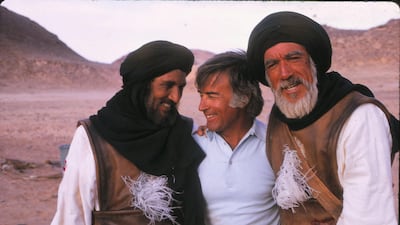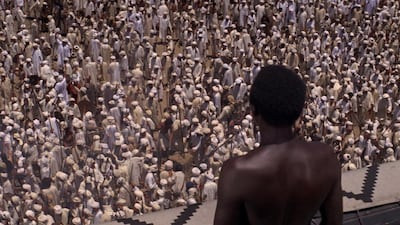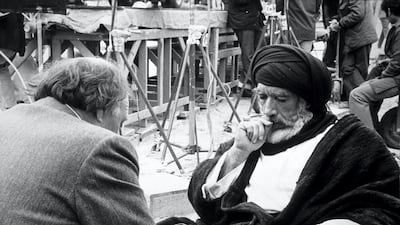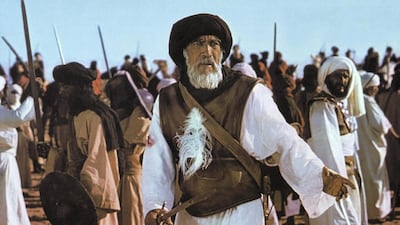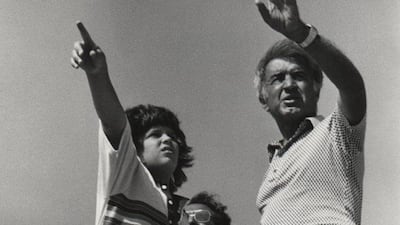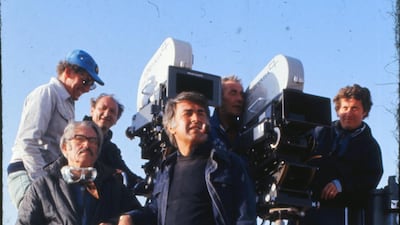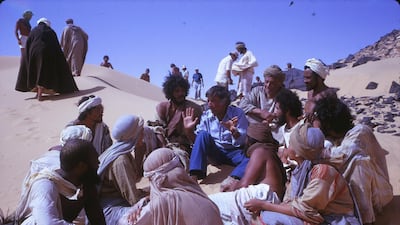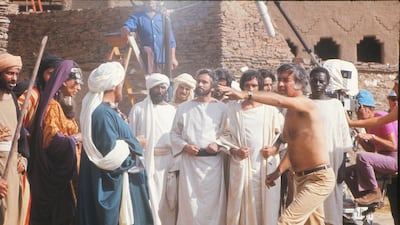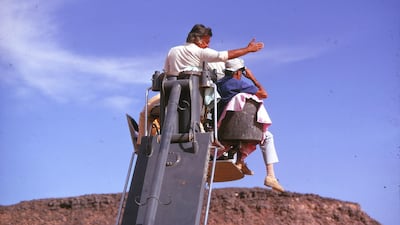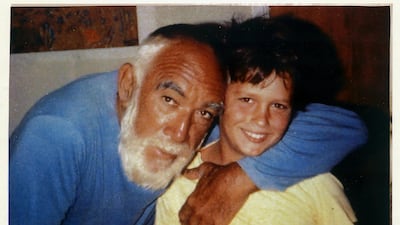It's been more than 40 years since Moustapha Akkad's classic The Message was released: it was greeted at the time by well-publicised controversy, protests over the film's English-language version in the West, and a virtual blanket ban on the Arabic language version at cinemas across the Middle East.
Now, Akkad's son Malek has painstakingly restored the movie in super-high resolution 4K format and, finally, won the film the Mena-wide cinema release it could not achieve in 1976. Malek Akkad is a film producer whose credits, interestingly, include following in his father's footsteps with the Halloween franchise (Akkad senior was the original slasher movie's executive producer).
Getting this year's The Message release may not have been quite as painstaking as his father's original endeavour. Akkad's dad faced religious objections, funding problems, and had to relocate the entire production and its two – English and Arabic – casts from Morocco to Libya six months from completion after pressure from religious groups forced the Moroccan government to shut down the shoot. But the restoration was still a laborious process, using about 10 laboratories and companies in the US and UK. Then came the small matter of getting the film into cinemas in a region where, in many countries, the film is still banned four decades after it was completed.
“We’ve had to resubmit the film in almost every country and put it through the censorship process all over again,” Akkad says. “There’s been a lot of nudging and cajoling to get it across the line, and there are a couple of countries we’re still working on, but things have changed so much now, there’s much more openness to things like cinema.”
Akkad recalls his father’s tales of the reception to his film: “It was pretty much banned across the whole Middle East,” he says. “I think it showed at a couple of theatres in Lebanon, and even that was controversial. King Hussein of Jordan did embrace it once he’d seen the film and became very good friends with my father, but other than that it was pretty much banned, or at least not screened, everywhere.”
As is so often the case when pressure groups call for art to be banned, many of those critical of The Message had not even seen the film, and it seems King Hussein's reaction to the film was shared by many of its critics who gave it a chance.
“I remember my dad saying that everyone he’d ever spoken to that was resistant to the film, once they saw it they’d changed their opinion and loved it. It took a while,” Akkad says.
Despite the cinema ban, audiences across the region acquired bootleg video cassettes and DVDs, and it is now a firm favourite on regional television schedules. Audiences clearly love the film, and Akkad insists that his father was simply trying to spread a positive message, and widen global understanding of Islam. The film tells the story of the life of Prophet Mohammed through peripheral characters who followed Him – but He is never depicted.
He “was trying to preach a message of love and peace, and yet he faced such opposition and controversy”, the director’s son says. “I think he was just so ahead of his time and for whatever reason people just weren’t ready for it.
“The fact that people found bootleg copies, TV picked it up and it became a huge favourite across the region proves the value of what he was doing, but it all just comes down to him being so far ahead of his time. He was so committed to this and believed so strongly in what he was doing, the fact that it’s lasted and holds up so beautifully is testament to his perseverance and hard work.”
It wasn't just Islam that Moustapha Akkad hoped to bring to screens, but the entire region. Malek Akkad reveals that when his father went to the United States to study film in the 1950s he originally "wanted to be a David Lean".On witnessing the extent of peoples' ignorance of the Arab world, however, his mission became a more personal one – to dispel the myths and serve as an ambassador.
Akkad reveals that his father had "loads" of scripts telling stories from the Middle East that he hoped to make, including his second film, Lion of the Desert, which told the story of Libyan Bedouin resistance to the Italian fascists during the Second World War.
Unfortunately, after the controversy surrounding The Message, including the death of a journalist and a policeman during a siege staged by the Hanafi Movement in the US, he found it increasingly hard to attract funding for his projects, and most of his later career was spent producing, rather than directing, films.
As a producer, can the younger Akkad be expected to resurrect some of his father's projects and bring them to the big screen? "Moustapha Akkad was a unique visionary, and I wouldn't pretend that I could step into those very large shoes, but as a producer I would love to see some of those films done," he says. "He had such huge ideas. When he started filming [The Message] in Morocco, he had plans to build a whole cinema city there that would train and develop professionals and do TV work, too.
“I’ve seen all the designs from back in the sixties, but sadly when they were shut down and forced out of Morocco that all went, too. I wouldn’t be arrogant enough to claim I can have anything like the same effect as he did, but if I can have just a fraction of that in my own work then I’ll be a very happy man.”
Akkad isn't quite finished with his father's work yet. His next project is a documentary about the fraught process his father went through to bring The Message to screens which, he hopes, to have ready for a festival release this year. He is also in the closing stages of the latest Halloween movie, which brings star Jamie Lee Curtis and writer John Carpenter back to the set, and follows directly on from the 1978, Akkad-produced original film.
He’s also planning on carrying on his father’s mission of assisting the region’s film industry by planning the Moustapha Akkad Endowment, which will send an aspiring film-maker to study at USC in California.
It’s clear which project is uppermost in his mind, however: “Right now, I’m just super-excited that the film’s finally releasing in the Middle East, and to be coming there to see it,” he says.
“I’m going to try and visit as many of the countries where it’s screening as I can. I can’t describe how proud I am, and I know my father would be, too.”
The Message, in Arabic and English, will be released in UAE cinemas on June 14
________________
Read more:
More than four decades after it was banned, The Message is set for Eid release in UAE cinemas
Prophet Mohammed biopic speaks to the enduring power of cinema
In a world where ignorance of Islam persists, The Message is as timely, necessary and fresh as ever
________________
